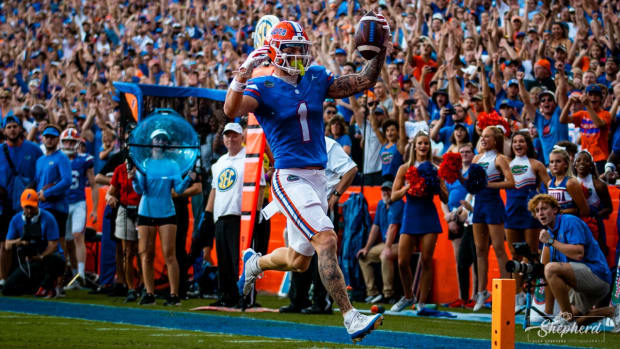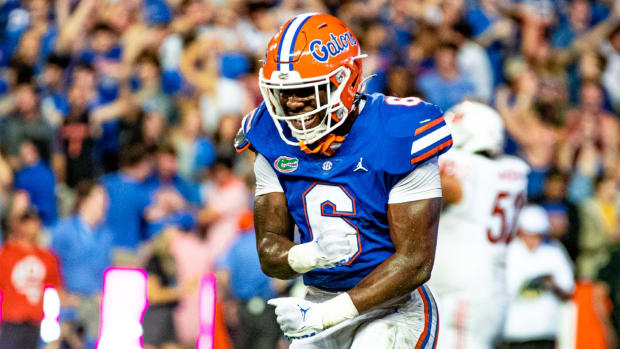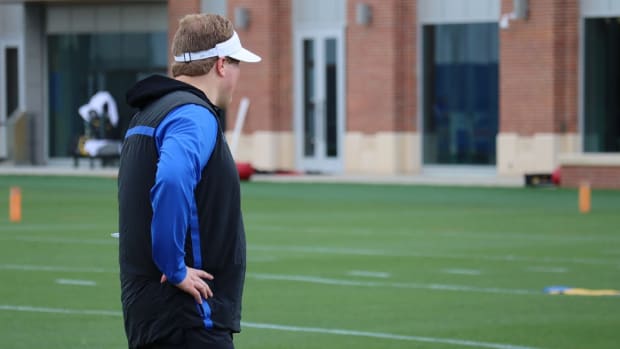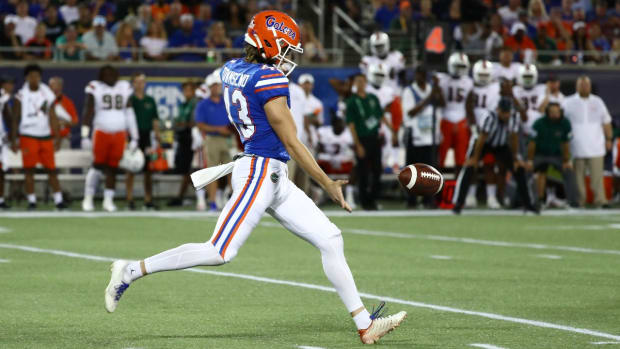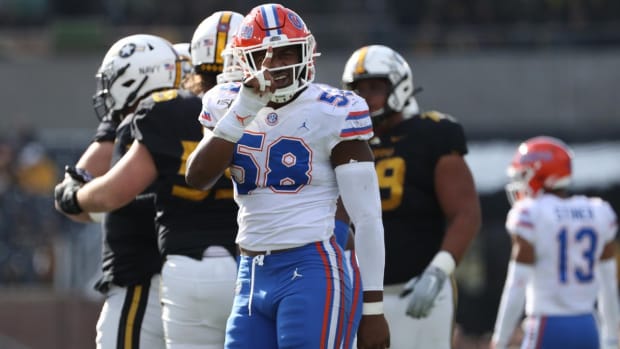The Good, the Bad and the Ugly from Florida’s Road Loss to Tennessee
The Florida Gators suffered their second defeat of the season on Saturday to fall to 2-2 (0-2 SEC) at the hands of Tennessee.
Struggling to combat the high-powered offensive attack the Gators faced from the opposite sideline, Florida's two straight conference play losses to begin the year will unofficially remove the team from the race for an SEC East title in year one of Billy Napier's reign.
However, despite suffering just the second loss in the past 18 series matchups with the Volunteers, not everything was negative for the Gators.
In fact, there's plenty to build off from Florida's trip to Rocky Top.
To recap, All Gators continues our weekly 'The Good, the Bad and the Ugly' series with a breakdown of Florida's performance against Tennessee.
Good: Passing Offense
Well, hello there, Anthony Richardson. It's nice to see you in this category again.
Who would've thought a road trip in front of 110,000 fans would be the thing that un-rattled him? Well, that was the case.
The Gators' signal caller who flashed star power with his week one performance against Utah positively reintroduced himself to the college football world against the Volunteers.
Richardson was a catalyst for Florida's success through the air in the five-point loss. Accounting for 453 yards and two touchdowns passing while adding 62 yards and two touchdowns with his legs, Richardson returned to his elite status without the hindrance of mental or schematic limitations.
It helped the unit overcome the relative ineffectiveness on the ground.
Not only did the stat sheet bode well for Richardson, but he also played with poise and awareness when working in the pocket as well as confidence-making throws down the field, unlike in the previous two weeks.
His pass catchers — a much-maligned aspect of the offense for their lack of separation and production — helped him out in a big way, with the likes of Justin Shorter, Ricky Pearsall, Xzavier Henderson and Keon Zipperer combining for 19 receptions, 338 yards and two touchdowns. The new approach they took this week worked well.
Their contributions aided Florida's air attack to an unexpected, albeit gladly welcomed, performance on Saturday. It kept the Gators in the game in the first half and was the reason UF crawled back with an opportunity to win late.
There are still things for Richardson to work on, like limiting a fumble in the red zone on the Gators' second possession of the half while down 10, but his career-outing is a building block toward high-level consistency.
Bad: State of the Roster
Roster building was one of the major areas of incompetence exemplified by the previous leaders of the Florida Gators program. Failing to bring in elite caliber talent, instead settling on low-to-medium tier four stars, the days of scheming up excellent game plans to topple better opponents on paper fizzled out in the form of a 6-7 season last year.
Napier did his best to caution the fanbase about the state of the roster before the season, inheriting the subpar unit to Florida's usual standards.
He cited the lack of depth as a problem in the early stages of his regime and proceeded to discuss the importance of talent acquisition in the upcoming cycles of prep recruiting and through the transfer portal for the structural rebuild to be a success.
Yet, there was still the belief that Florida could overcome that reality with immediate on-field success this season because it's happened in the past when a new staff takes over. That idea became a widespread opinion after the upset win over Utah.
Accordingly, the Gators were hurt on Saturday by the talent (or lack thereof) left behind by the previous staff. However, it was the second and third units in rotation that directly negatively affected the outside.
It's the veterans stained with deficiencies of miscommunication, lack of effort and selfishness from the previous regime. On Saturday, that was evident with the way Florida's defense, specifically, operated.
The Gators recruiting efforts are trending in the right direction as of now. Pairing that with the flashes from young pieces like right tackle Austin Barber, linebacker Shemar James, defensive lineman Chris McClellan and other cornerstones to the unit, the future looks bright.
Meanwhile, expectations for the present should be tempered, considering the struggling veterans on the first team and imminent growing pains if the staff elects to look down a shortlist of replacement options.
Ugly: Florida's defense struggles again
The Florida defense did not force a single punt on Saturday in Knoxville, producing a second rough performance in a row.
There are major similarities and differences between USF and Tennessee that go beyond the talent on the field. Schematically, the Bulls are a rushing team that will look to complement that facet of the game with the occasional pass, while Tennessee is a highly effective, pass-first unit.
Alarmingly, both cooked up season-best performances against Florida's defense.
On multiple occasions, miscommunication and lack of awareness led to blown coverage assignments. Notably, veteran safety Trey Dean III was picked on by the Volunteers' offense throughout the day as he allowed multiple streaking wideouts to run past him despite being the last line of defense.
Quarterback Hendon Hooker had a career day (similar to Richardson) as he totaled 461 all-purpose yards and three total touchdowns on the day.
Tennessee recorded 17 big plays (passes of 15 or more yards and rushes of 10 or more) as a result. One of those sequences kickstarted a 99-yard scoring drive by the Vols to retake the lead heading into the halftime break.
They accounted for 429 yards on those plays to ultimately dictate the game's outcome.
Tennessee's use of the entire field expedited the defensive collapse Florida faced in the second quarter and beyond. Simply put, the explosive, up-tempo passing attack Florida focused on slowing all week did whatever it pleased.
The similarity the two teams present is the dual-threat capabilities of their quarterbacks. In week three, Gerry Bohanon picked up 150 yards and a touchdown against Patrick Toney's unit without hesitation, especially before halftime.
Facing a similar playmaker in Knoxville, the Gators had the blueprint of what they did wrong in week three to not allow Hooker to take off for chunk yardage down the field.
Implementing a QB spy is one fix. Another is holding contain, collapsing the pocket and finishing the play to bring him down for a sack. The Gators did neither effectively, resulting in 112 yards and a touchdown from him on 13 carries.
His arm was still the area of utmost concern, but Hooker's all-purpose impact on the game made the difference — and it will continue to for Tennessee moving forward.
The Gators have a lot to fix on the defensive side of the ball — pinch me if you've heard that before — as they enter the bulk of their conference schedule after a tune-up game against Eastern Washington.
Stay tuned to All Gators for continuous coverage of Florida Gators football, basketball and recruiting. Follow along on social media at @AllGatorsOnFN on Twitter and All Gators on FanNation-Sports Illustrated on Facebook.


